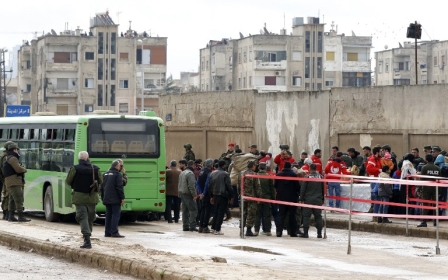Syrian government regains total control of Homs
The Syrian government has regained full control of Homs, after hundreds of Syrian rebels and their families left the last opposition-held district of the central city on Sunday.
The Russian-supervised evacuation of the Waer district was the latest blow to the opposition by government troops backed by their Russian and Iranian allies.
This is the first time since the start of the war in Syria that Homs has come under the complete control of President Bashar al-Assad's forces.
Since December, the rebels have lost their former bastion of Aleppo and nearly all of the areas they controlled in Damascus.
This latest opposition setback is mostly symbolic, however, as most of the rebels had been driven out of Homs in 2014 after two years of bombardment and stifling siege.
"The last bus [with evacuees on board] has left the Waer neighbourhood," Homs provincial governor Talal Barazi told AFP news agency.
On Saturday, he had said that 3,000 evacuees, including 700 rebels, were due to be taken out of Waer.
"There are no more weapons or armed men in Waer... we can declare Homs to be a secure city," Barazi said, referring to the opposition fighters.
Government forces backed by the Russian military have already moved into many areas of Waer, according to state media, which had already been under a long siege.
The Russian-supervised operation began two months ago and has been carried out over several weeks.
Under the deal, opposition fighters are granted safe passage by the government out of Homs to rebel-held areas elsewhere in Syria.
Thousands of opposition fighters and their families have left a number of areas in western Syria in recent months in what the government calls reconciliation deals. Assad's government now controls the country's main urban centres.
The opposition and the United Nations have criticised the deals as forced displacement of Assad's enemies, often after months or years of siege and bombardment.
One of the rebels leaving al-Waer on Sunday said many of the fighters had come to the district from other areas of Homs, including the Old City, after those areas were retaken by government forces earlier in the conflict.
"I don't want to stay here. I'll go to Idlib, and want to go on to Turkey and then Europe after that," he told a Reuters journalist on the scene before the buses left, without giving his name.
Evacuees have mostly headed for Idlib province, or for Jarablus, a town along Syria's northern border near Turkey.
Waer has been under full siege for more than a year, according to the Britain-based Syrian Observatory for Human Rights monitoring group.
Barazi said that more than 14,000 people had left al-Waer in several phases since the agreement began to be implemented in March. Among them were some 3,700 rebels, allowed to leave with their light weapons.
State television early on Sunday showed rebels milling around, depositing bags and suitcases in front of buses, and holding Kalashnikov assault rifles as armed men from the government side watched the proceedings.
Some 1,150 rebel fighters have decided to stay in the district and hand over their weapons under a government amnesty, Barazi said.
The Syrian conflict, now in its seventh year, has killed hundreds of thousands of people and displaced more than 11 million.
New MEE newsletter: Jerusalem Dispatch
Sign up to get the latest insights and analysis on Israel-Palestine, alongside Turkey Unpacked and other MEE newsletters
Middle East Eye delivers independent and unrivalled coverage and analysis of the Middle East, North Africa and beyond. To learn more about republishing this content and the associated fees, please fill out this form. More about MEE can be found here.




